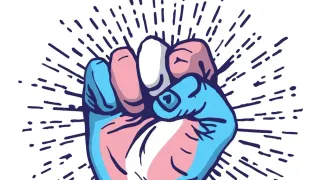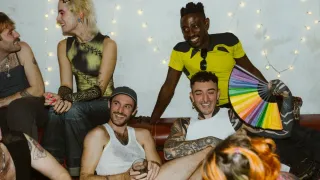
9 hours ago
Colby King Is Building a Queer Renaissance: How the Kiki Scene’s Next Generation Is Claiming Power Through Art
READ TIME: 3 MIN.
If you’ve wandered through New York City’s nights and heard the pulse of a ballroom track, you know: the Kiki scene isn’t just a party—it’s a revolution. It’s where artistry, resilience, and chosen family collide, especially for queer youth of color who have, for decades, been the unsung architects of global pop culture. Now, thanks to activist Colby King, the scene is getting its due not just as a creative powerhouse, but as an engine of economic empowerment .
King, a Texas native and Columbia University grad, knows firsthand the feeling of being unseen. “Being a Black LGBT person, there often weren’t many spaces that I felt seen or accepted,” he recalls. “Coming into the Kiki scene has just given me a way to be around people that are actually like me” . That sense of belonging isn’t just personal—it’s political. King’s mission: to ensure the scene’s young creators don’t just shine, but get paid and recognized for the culture they’ve built.
King’s recent $200,000 David Prize win isn’t about personal glory. He’s quick to deflect the spotlight: “While I am the person that won this prize, there’s a lot of people that are already doing pretty good work to support LGBT youth, particularly in the Kiki scene,” he says. “I’m going to be adding to a wide network of people that are already doing good work and wanting to uplift the scene as a whole” .
With that grant, King is launching the Kiki Arts Collaborative (KAC), a game-changing initiative that offers a nine-month residency for established artists and a six-month Creative Career Development Fellowship for emerging talent. The Collaborative isn’t just about voguing and performance; it’s about giving participants the skills to negotiate contracts, build portfolios, and step into industries from fashion and media to academia and marketing .
Through partnerships with legacy institutions like the Bronx Academy of Arts and Dance and the National Black Theatre, the Collaborative is opening doors that have long been closed to queer artists of color . It’s a radical shift: the skills you learn battling on the runway—styling, storytelling, leadership—are now your ticket to broader success.
The Kiki scene isn’t just a subculture—it’s the beating heart of American creativity. Born from the Harlem drag balls of the 1960s and ’70s, Kiki emerged as a youth-centered, more accessible spin-off in the 2000s, hosted through LGBTQ+ health outreach centers and community spaces. It’s a place where chosen families form, where queer youth—especially Black and Latino—find safety, expression, and hope .
Yet, despite driving mainstream culture (hello, Madonna’s “Vogue,” RuPaul’s Drag Race, every major fashion week), the Kiki and ballroom communities have faced systemic barriers: lack of wealth, institutional gatekeeping, and exclusion from traditional artistic industries. King’s work aims to upend that. “The goal is to use these different programs to advance the careers of artists in the Kiki scene and to think about how they can take the talents that they’ve cultivated within the scene and apply them to career fields outside,” King explains .
For King, it’s about more than money—it’s about justice. The future of art, media, and civic life depends on the inclusion of voices that have been marginalized for too long. By bridging the Kiki scene’s brilliance into the creative economy, King is redefining what power looks like for queer youth.
King’s approach is refreshingly communal. He’s not here for individual stardom, but collective advancement. “I’m really grateful to be a winner,” he says, “but I’m not a person that necessarily likes the spotlight. This grant isn’t about me—it’s about building up my community and highlighting the scene at large by using whatever visibility that comes with it” .
The Collaborative is already shaping up as a model for how arts institutions can nurture queer talent—not just in New York, but globally. By prioritizing financial literacy, mentorship, and professional networks, King is making sure that the next generation of ballroom stars don’t just survive—they thrive .
In a world where queer and trans artists of color are often asked to do more with less, King is flipping the script. The Kiki scene is no longer just a place to escape; it’s a place to build, uplift, and transform.
King’s story is urgent and timely. At a moment when anti-LGBTQ+ legislation and cultural backlash threaten queer spaces across the U.S., the Kiki Arts Collaborative stands as proof that our culture is more than resilient—it’s economically powerful .
And for every young artist voguing at a ball, painting their truth, or dreaming up the next big thing, King’s work is a call to action: claim your space, know your worth, and build the future you deserve.
The Kiki scene has always been about survival and celebration. Thanks to Colby King, it’s now also about prosperity—and that’s a legacy worth strutting for.






